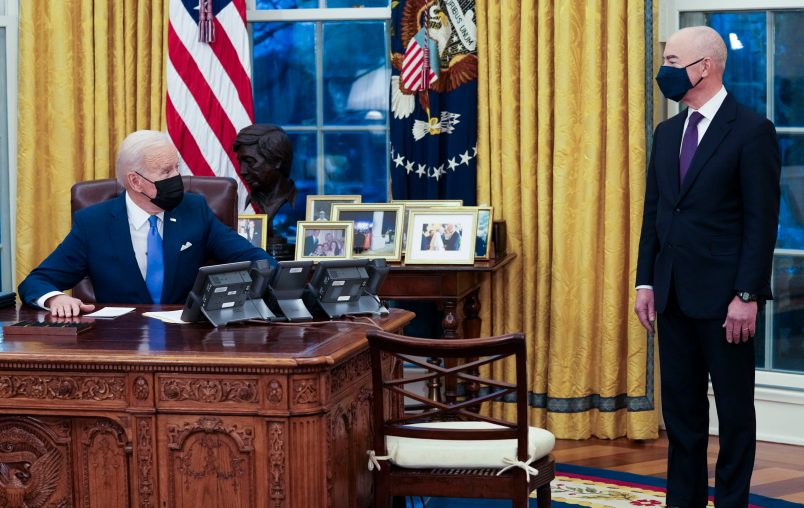In a low-key, one-page order, the Supreme Court on Thursday levied another blow against the Biden administration’s exercise of agency power.
This time, the topic was immigration. The Court, on a 5-4 split, is letting a lower court decision stand that prohibits the Department of Homeland Security from implementing a deportation policy until the Court hears the case this winter. The order included no explanation of the majority’s decision to deny the stay. The government had asked that the administration be allowed to carry out its policy in the meantime.
Justice Amy Coney Barrett joined the three liberals in dissent; it was Justice Ketanji Brown Jackson’s first involvement in a case since she was sworn in last month.
The government is arguing that acceptance of the arguments against the policy lodged by Texas and Louisiana would have a profound and revolutionary effect on executive branch power, and would give states tremendous power to knock down agency policies they don’t like.
The states are essentially arguing that the new policy, which outlines groups of undocumented immigrants for DHS to prioritize for arrest and deportation, may indirectly cost them more by perhaps requiring them to keep more immigrants detained or to provide them with benefits.
U.S. Solicitor General Elizabeth Prelogar argues that giving states standing to sue on such indirect injuries from federal policies would give them extensive license to “challenge virtually any federal policy by leveraging even a dollar’s worth of incidental, indirect effect on state expenditures into a nationwide vacatur or injunction.”
Perhaps more worrying, Prelogar adds, in this case, one (Trump-appointed) district judge granted nationwide relief from DHS’ policy, not even restricting it to the states challenging the guidance — meaning that one fairly low-level judge would have the power to single-handedly dictate national immigration policy.
That dynamic encourages “judge shopping,” University of Texas law school professor Steve Vladeck writes in an amicus brief. In this case, Texas filed in a division miles away from both the state capitol and the southern border where there’s only one judge: Drew Tipton, the Trump appointee with a history of knocking down Biden administration immigration policies.
DHS Secretary Alejandro Mayorkas issued a memo in September 2021 outlining which groups of undocumented immigrants should be prioritized for apprehension and removal: they include suspected terrorists, those accused of serious crimes and those caught at the border.
Texas and Louisiana were not the only states that sued. Arizona, Montana and Ohio did too, though with a very different result. The Sixth Circuit stayed and then reversed a preliminary injunction on the DHS guidance, determining that the states were unlikely to succeed on the merits.
After getting their favorable ruling from Tipton, however, Texas and Louisiana were handed another win by a notably conservative panel of judges at the Fifth Circuit Court of Appeals, which declined to block Tipton’s order while the administration appealed.
“The district court’s reasoning contradicts not only the Sixth Circuit’s decisions, but also the historical practices of the Executive Branch,” Prelogar wrote, adding: “For most of our Nation’s history, a suit like this would have been unheard of. Courts did not allow States to sue the federal government based on the indirect, downstream effects of federal policies.”
Traditionally, the high court has given agencies like DHS wide discretion in when they choose not to take enforcement action.
What’s more, the government argues, Texas and Louisiana’s arguments about the extra cost they’d incur are not even necessarily true: prioritizing which immigrants to target doesn’t necessarily mean that DHS will be pursuing fewer people, and leaving more migrants in detention to be cared for by the states.
Despite its recent history of hostility towards the administrative state, the Supreme Court may ultimately side with the administration when it hears the argument in November or December. At the end of this year’s term, Chief Justice John Roberts and Justice Brett Kavanaugh joined the liberals to ultimately allow the administration to end the Trump-era “Remain in Mexico” policy after letting a lower-court order forcing the administration to reinstate it stand for months. And in this case, Barrett, for one, seems wary of going as far as the red states would like.
But at the very least, they’ll let the Biden administration sweat it out for a few months, while DHS complains that it has to abandon a policy that’s been guiding the training and actions of its employees.
And at the worst, the Court could uphold the arguments of Texas and Louisiana, providing a blueprint for red states seeking to topple policies from an executive branch they oppose, a further blow to the administrative state.
“If it were accepted, that theory would allow the federal courts to be drawn into all manner of generalized grievances at the behest of States seeking to secure by court order what they were unable to obtain through the political process,” Prelogar warns.







The United States is a failed experiment.
If guys are into blue Governors, then with the exception of Alabama’s nominee, it’s man the ramparts time.
It’s all the rage…VOTING.